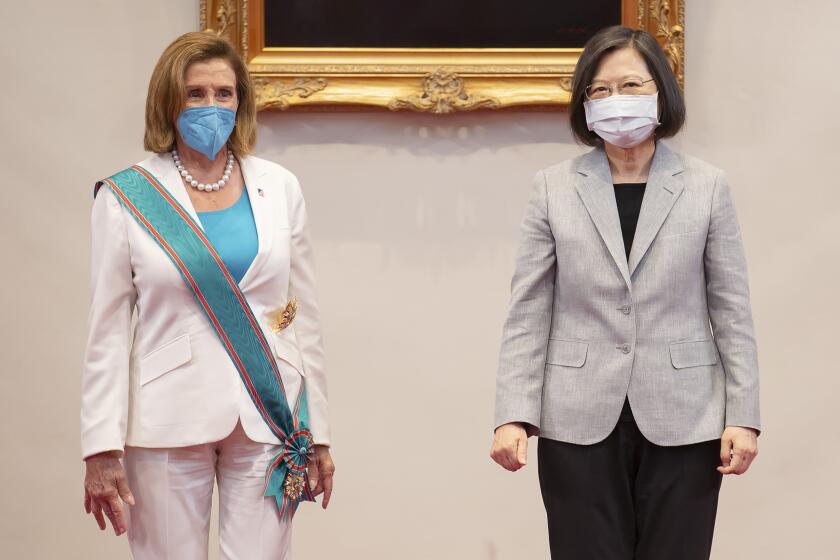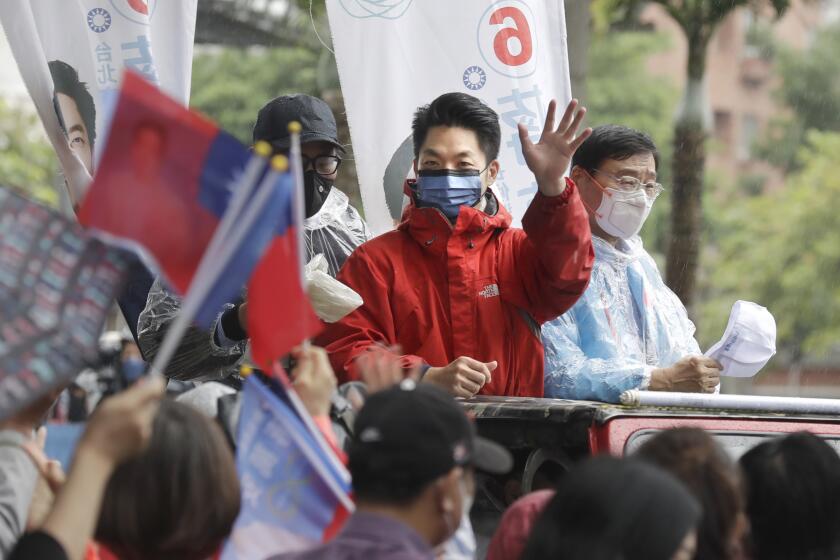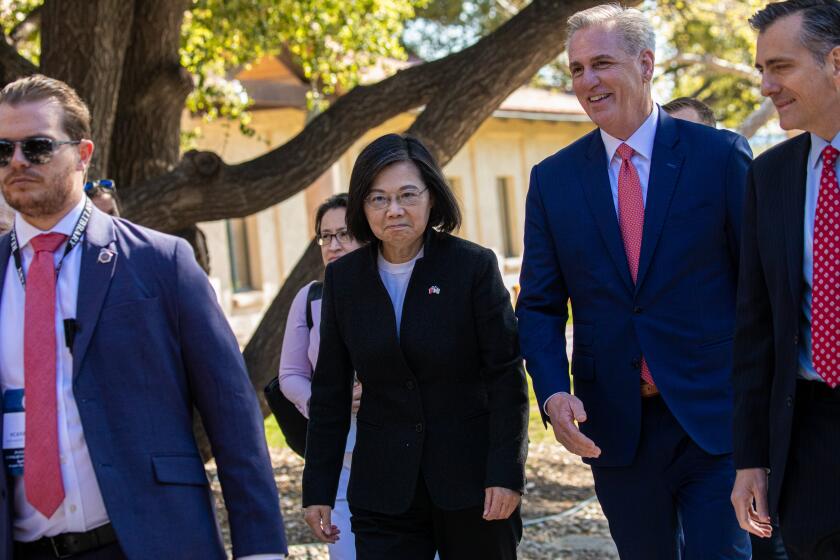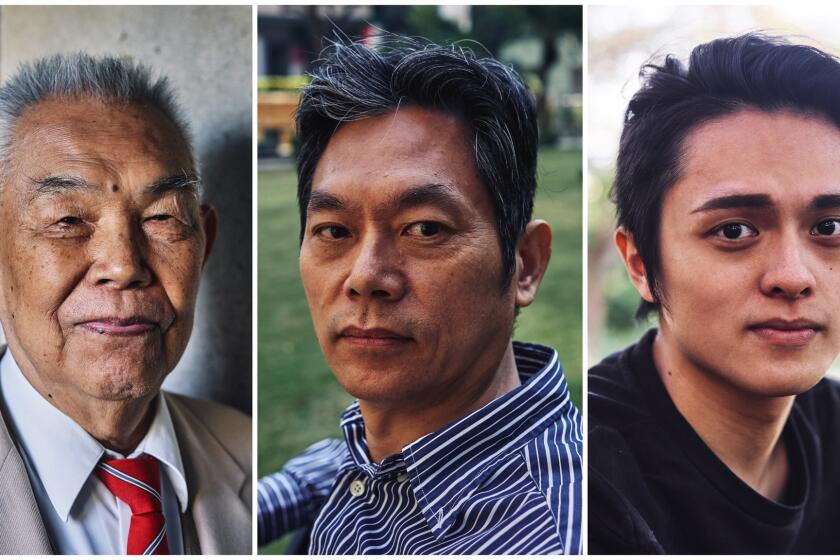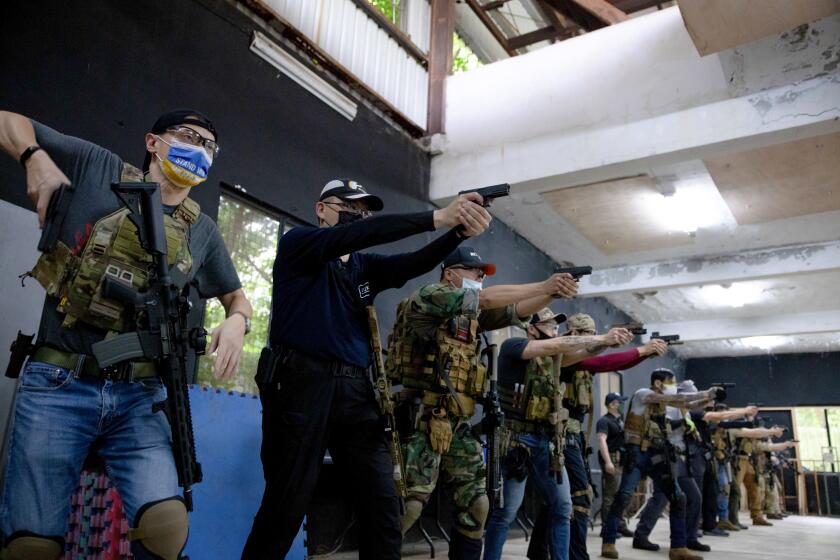The ‘no China’ policy: Inside the alternative universe of Taiwan’s ‘West Wing’-like hit
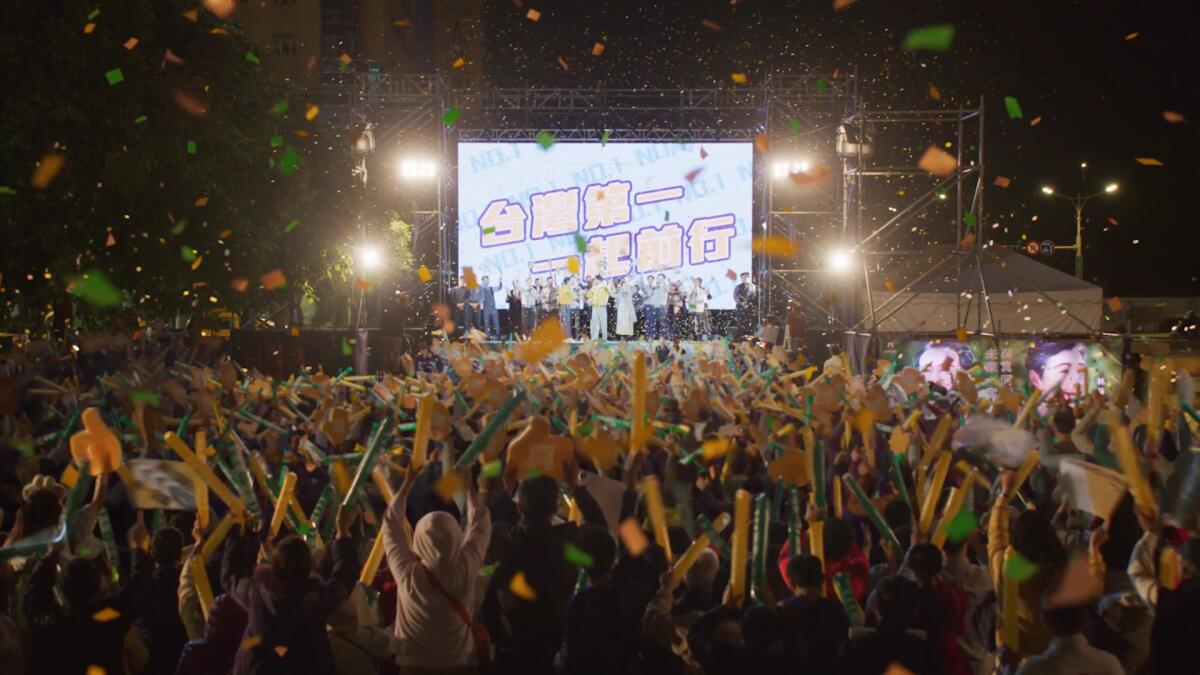
- Share via
TAIPEI, Taiwan — Plagiarism rumors. Election rallies featuring inflated batons and cheers for “frozen garlic.” Boozy karaoke after-parties.
A popular new Netflix drama set in Taipei depicts all the hallmarks of a Taiwanese political campaign, with one glaring omission: debate over how to handle China.
That existential question is looming over Taiwan’s actual presidential election, to be held in January. While China has long declared the self-ruled island a part of its territory, relations between Beijing and Taipei have deteriorated to their worst state in decades, raising the risk of military conflict.
But the eight-part series “Wave Makers” makes no mention of cross-strait relations, focusing instead on the everyday lives of campaign staffers trying to get their candidate elected president of Taiwan.
For some fans, that’s a large part of its appeal. For the show’s creators, it was a conscious decision to keep their fictional drama from getting swallowed up by real-world events — though, in an ironic twist, “Wave Makers” is causing ripples in the real-life Taiwanese political scene.
“It’s kind of like an alternative universe — how Taiwanese politics could look like if, and only if, China weren’t an issue,” said Chieh-ting Yeh, director of the think tank US Taiwan Watch. “At least to me, it’s quite refreshing.”
The show follows Weng Wen-fang, a gay senior staffer with the opposition party who is grappling with her future in politics after her loss in a local council race. She befriends recent recruit Chang Ya-ching, supporting the younger woman through a sexual harassment claim at work and the fallout from an affair with a prominent politician. Others in the office struggle with work-life balance and waning idealism.
China’s furious response could drive more Taiwanese toward independence and push neighboring Asian nations to strengthen their defense strategies.
When the first episode opened with a political rally in Taipei — featuring attendees waving party flags and shouting “dongsuan,” Taiwanese slang for “win the election” that translates literally as “frozen garlic” — 34-year-old Lee Meng-huah assumed that talk of China would soon crop up. She was pleasantly surprised that it never did.
Lee, a Tainan-based pharmaceutical worker, considers herself indifferent to politics and usually prefers Korean dramas to Taiwanese ones. But on her husband’s recommendation, she began to watch “Wave Makers” and found herself sympathizing with the characters. As a mother of two, she understands what it’s like to juggle work and family, and she recalled a similar sexual harassment complaint unfolding in a previous workplace.
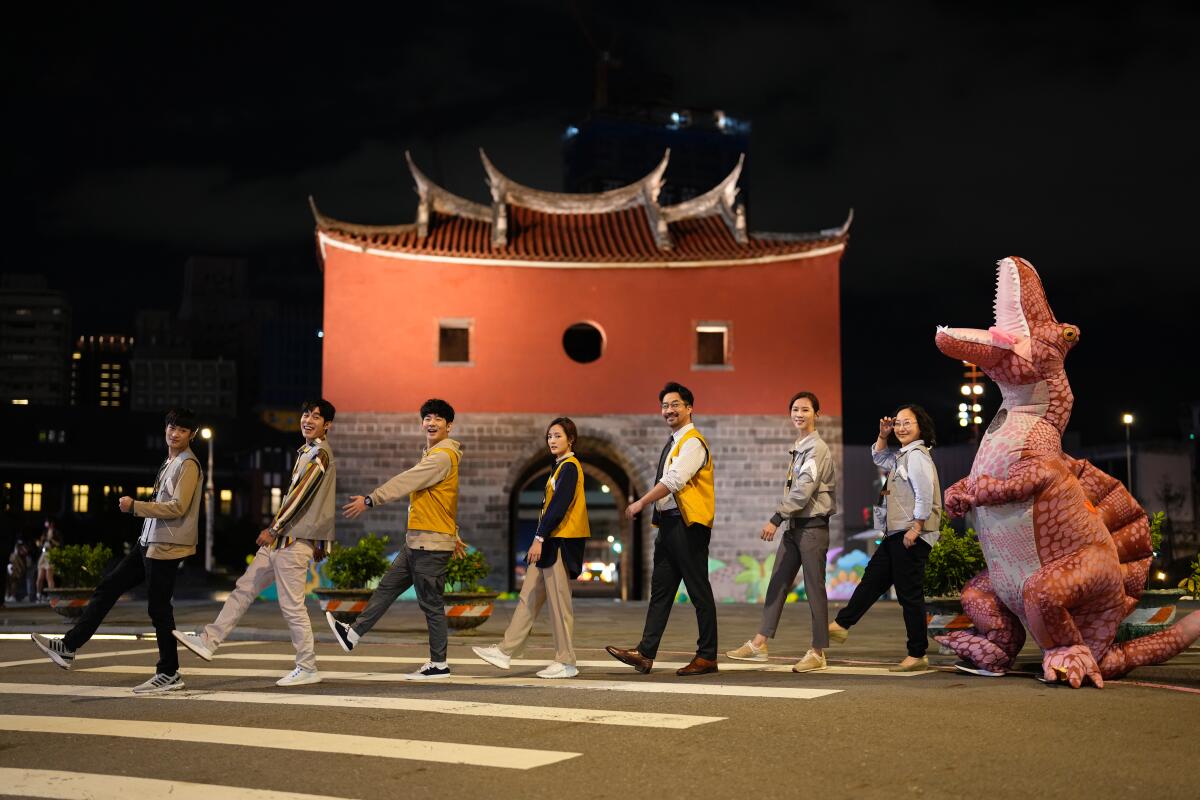
“It’s written very close to the kinds of problems we encounter in our lives,” she said. “If it had explored cross-strait relations or the question of Taiwan’s independence, I think it would have muddled the point of the whole show.”
Political dramas like “Wave Makers” are a rarity for Taiwan. The legacy of martial law, which was in place until 1987, and the desire for access to the mainland Chinese market have made political portrayals particularly sensitive.
Taiwan’s nationalist party is looking to the purported great-grandson of Chiang Kai-shek to refurbish its image.
The works that do exist are often rooted in historical events, such as the four-decade postwar “White Terror” era of mass suppression and brutality under the Nationalist Party. A well-received series from 2020, “Island Nation,” is set in the 1990s during Taiwan’s transition to democracy.
For modern-day inspiration, “Wave Makers” screenwriters Chien Li-ying and Peng Wei-chao (better known by her pen name, Cynical Chick) turned to U.S. shows like “The West Wing,” “House of Cards” and “Veep,” as well as Korean political dramas.
But choosing to leave out any reference to the biggest geopolitical challenge facing Taiwan today didn’t come easily.
“We struggled with this decision for a long time,” said Chien. “If there’s no cross-strait relations, then it’s not realistic. But it’s also difficult because you don’t want it to become something where this side or that side doesn’t watch. And once you bring it up, whatever else you talk about, no one will care.”
A visit to California by the current president of Taiwan and a trip to China by her predecessor encapsulate the choices facing the self-ruled island.
Ultimately, the writers prioritized mass appeal — and making the politics of the show as apolitical as possible.
Whereas the plot originally pitted against each other a male and female presidential candidate, both were rewritten as women to avoid direct comparison of a lone female contestant with President Tsai Ing-wen. One of those characters takes a rare stance against the death penalty — an issue that cuts across party lines.
Off screen, Taiwan’s relationship with China is one of the most contentious and defining issues that presidential candidates will have to grapple with in the January election.
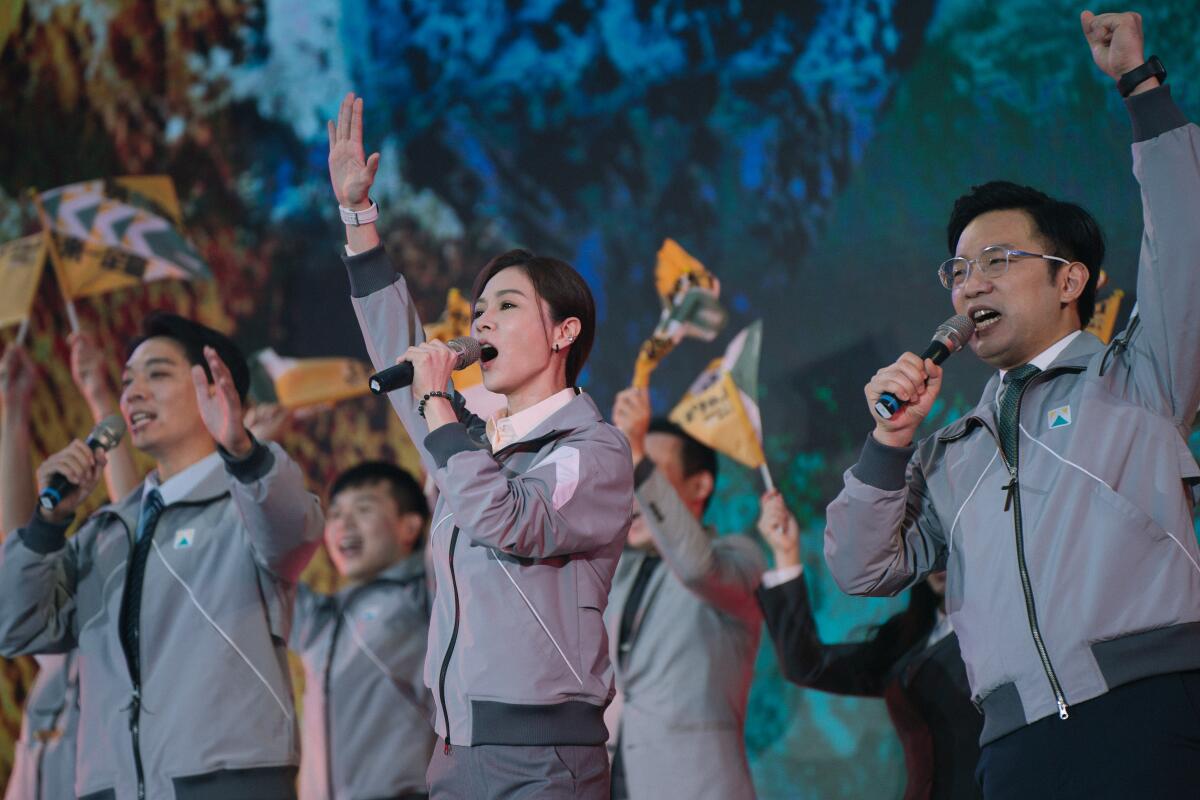
While the majority of Taiwanese support preserving the status quo, politicians are deeply divided on how to do so as tensions worsen, even within their own parties.
During Tsai’s eight years in power, the ruling Democratic Progressive Party has strengthened ties with the U.S. as its relationship with Beijing has grown chillier. Detractors of the party, which leans toward independence for Taiwan, worry that too much confrontation could further provoke China’s ire.
The Nationalist Party, better known as the Kuomintang, or KMT, favors closer cooperation with Beijing and is more open to unification with mainland China. While the party argues that it’s better suited to leadership because Beijing is more willing to engage with its officials, many voters are wary of becoming too friendly with an authoritarian government that considers the island its rightful territory.
According to a May poll by the Taiwanese Public Opinion Foundation, the DPP presidential candidate Lai Ching-te leads the race, with 35.8% approval, followed by the KMT’s Hou Yu-ih, with 27.6%, and Ko Wen-je of the Taiwan People’s Party, with 25.1%. Ko, who founded the TPP four years ago, has tried to position himself as the middle-ground alternative between the DPP and KMT.
Despite keeping the real world at arm’s length, “Wave Makers” has roiled Taiwanese politics all the same, helping spur a #MeToo-type reckoning a month after its release. Last week, a former DPP staffer, inspired by the show, accused her former supervisor of mishandling a sexual harassment complaint she made in 2022.
Several more staff members made similar allegations within the ruling party.
Tsai apologized to the victims as the former chairperson of the DPP, and some accused officials have resigned. Lai, the DPP’s presidential candidate, said the party would take a zero-tolerance approach to sexual harassment, quoting a popular line from “Wave Makers” in his apology: “We won’t just let it go.”
The KMT’s candidate, Hou, said his party would handle reports of sexual harassment rigorously after a legislator and former researcher at a party-affiliated think tank were accused as well.
In mainland China, where Netflix is blocked and “Wave Makers” is omitted from the biggest movie review site, posts about the show were viewed more than 110 million times on social media before they were censored.
Since Russia invaded Ukraine, more Taiwanese say they are willing to fight if attacked by China. But without firearms or sufficient military training, many wonder how to prepare.
Comments applauded the show’s focus on progressive issues, such as sexual harassment and same-sex marriage. China’s own #MeToo movement has stalled under heavy censorship, and resources for queer communities have grown scarce as the government has increased pressure on civil society. For some viewers, the existence of a Chinese-language drama about a presidential election also highlighted the political differences between Taiwan and China.
One person from Guangdong wrote about the complicated emotional reaction on Weibo, China’s Twitter-like platform: “It’s not quite the same as watching ‘The Good Wife’ or ‘The Good Fight.’ Seeing the people on screen speaking Chinese, saying they use elections to fight, denouncing workplace inequality … you see the same cultural background growing into two completely different forms.”
Chien and Peng didn’t expect to start a movement, or reach Chinese audiences, when they started writing the script in 2019 with the goal of spotlighting women’s experiences. With funding from Taiwan’s Public Television Service and the Taiwan Creative Content Agency, founded by the Ministry of Culture to support Taiwanese content, they finished production before showing the first two episodes to Netflix in November. “Wave Makers” appeared on the platform five months later.
Start your day right
Sign up for Essential California for the L.A. Times biggest news, features and recommendations in your inbox six days a week.
You may occasionally receive promotional content from the Los Angeles Times.
The screenwriters, who have started work on a second season, said streaming services like Netflix have allowed the local industry to experiment with more themes and take chances on riskier projects like “Wave Makers.”
The services have also broadened potential international influence, something that became clearer to the writers after the show was released.
“Actually, our show can let the world know Taiwan is a real place, not just a pawn between major powers or a chipmaker,” Peng said. “So although it is a drama, it has even more value than that.”
Yang is a staff writer and Shen a special correspondent.
More to Read
Sign up for Essential California
The most important California stories and recommendations in your inbox every morning.
You may occasionally receive promotional content from the Los Angeles Times.
